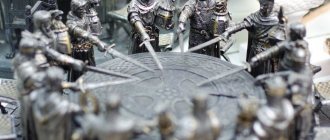Leadership theory
The most popular theory is that leaders are born, not made, that is, the theory of character, or “great man.” This refers to the innate inclinations and abilities of a person that help a person become a leader.
The second theory is situational. According to it, innate characteristics alone are not enough; certain conditions of the external world and the relationship between these conditions and a given individual are also needed. That is, the role is played by the extent to which the situation allows the leader to express himself.
How to help your child develop leadership skills
Let me remind you that a leader is someone who is ready to take responsibility. He clearly sees his own goal and persistently moves towards it. To teach your baby these properties, just use some useful tips:
- Gaining experience. To do this, children must have free space. Don’t try to protect them from mistakes - they need to make mistakes and draw conclusions from it.
- Competitions. But this does not mean that you should focus solely on winning. A true leader must proudly accept defeat.
- Personal obligations. From an early age, a person should realize that all his actions have consequences.
Leader Features
The most important feature of leaders is charisma. Read more about this in the article “Charisma: what is it in a person and how to develop it.” Other characteristics of a leader include:
- high level of aspirations;
- a high self-evaluation;
- self-esteem;
- self-awareness;
- adequate assessment of the strengths and weaknesses of one’s personality;
- the desire for success (importance and responsibility), recognition, power (managing people, directing them in a certain direction).
Of course, without certain competencies and abilities, a set of such qualities can give a completely different result. Therefore, other qualities of a leader include:
- above average intelligence, ability to solve complex and abstract problems;
- independence, resourcefulness, business activity, readiness for action, initiative;
- the ability to see the situation broadly, to consider beyond the particular;
- knowledge and experience in a specific field;
- good health, developed imagination, attention, memory, thinking;
- emotional balance and stress resistance;
- the ability to self-regulate (the ability to relieve stress);
- communication skills;
- ability for psychoanalysis;
- eloquence;
- visuality (external attractiveness).
Thus, all the qualities of a leader can be divided into general, specific, personal-business and psychological-pedagogical.
Management psychology as scientific knowledge
This direction is a hybrid of two theoretical bases - psychology as a science about the properties of the human psyche and management as a science about all aspects of organizing a purposefully and optimally functioning social system. The search for the most successful relationship between psychological and non-psychological characteristics in the management process is considered the most pressing issue in management psychology.
This science operates with such important procedures for the formation of a methodology of knowledge as generalization and systematization of facts and phenomena, data obtained by experimental and statistical methods in the field of human measurements and management.
The field of knowledge in management psychology is defined by:
- The degree of relevance of a particular problem of modern management;
- The need to develop the most effective management methods;
- The spread of the tendency to perceive the employee, first of all, as an individual with his own social rights and responsibilities; this approach requires management to use human resources, taking into account all the psychological characteristics of each group member, but in the most effective ways for the organization;
- Requirements for organizing an optimized management system for a group, enterprise, etc. [4, p. 2].
Therefore, we can say that management psychology is a branch of psychology that accumulates the achievements of other sciences to study the psychological side of management, its optimization and increasing the level of efficiency of management activities [6, p. 16].
Types of Leadership
Leadership can be emotional, business and informational.
Emotional
It arises on the basis of sympathy in the group between the participants and the leader. An emotional leader creates a favorable psychological climate, inspires trust, relieves tension, and instills confidence. This is the heart of the group. You can always contact him. As a rule, an emotional leader appears in informal groups.
Business
This type of leadership is found in formal teams. A business leader is distinguished by high competence, the ability to solve problems, and organize activities. These are the hands of the collective. A business leader builds relationships and communicates closely with management.
Informational
The information leader is the brain of the team. He is well versed in information flows and is highly erudite. People turn to the information leader for help and advice. He helps you search for information or answers questions himself.
The ideal option is a combination of all three types in one leader, but this rarely happens. More often there is a combination of a business leader and an emotional or informational one.
The direction of leadership can be:
- Constructive. Helps achieve organizational goals.
- Destructive. The leader's aspirations are detrimental to the organization.
- Neutral. Does not affect performance.
Rule 1. Create the right atmosphere for employees to discuss
If the work was not very successful, then the general background of the discussion still needs to be made positive. The technique is simple: the manager can invite everyone present to express a few words of gratitude to two or three colleagues for what really helped them work together. It would be right if the manager is the first to thank someone, only indicating what specifically for. Celebrating the success of employees also sets them up for further work. What you encourage, people try to do, maybe not right away, but they get used to a good attitude and respond in kind.
Types of Leadership
Among the types we can distinguish a leader, a leader in the narrow sense and a situational leader:
- The leader acts by suggestion. He is active, strong, physically developed, healthy, strives for success, self-confident, has the ability to adapt, is smart, has developed creativity and intuition, is tactful, sociable and easy to communicate.
- A leader has less authority than a leader. He also convinces and inspires, but he also motivates using the “do as I do” method.
- A situational leader emerges in a specific situation due to his strong abilities needed at the moment.
In relation to the attitude of the team to the leader, it is customary to distinguish the following types:
- "One of us". He does not stand out among the group in any way, but is perceived by her as first among equals.
- "The best of us." In almost all qualities he stands out from the group and acts as a model.
- "Good man". Valued and distinguished by the team for his moral qualities.
- "Servant." Considered as an intermediary, a representative of interests.
The same leader can be perceived differently by team members, that is, he belongs to several types at once. In general, there are leaders in any group, both official and unofficial, both destructive and constructive. For example, the example known to everyone since school was the prefects (formal leader) and hooligans (informal leader) of the class.
Varieties
The term “leadership” comes from psychology. This process involves social influence, when a person receives help from others to achieve a common goal. The set of characteristics of a leader depends entirely on what type he belongs to.
The most famous classification identifies the following types:
- Business. Places in teams united by work or production tasks. Here you will need such features as competence, experience, the ability to make quick decisions, as well as authority. The main requirements in this case: productivity and creative thinking.
- Emotional. Characteristic of psychological groups. A person gains weight due to individual sympathies and his own charisma and charm. Such a leader must inspire respect, trust and love among those around him.
- Situational. It can belong to both the first and second categories. Its difference is that it is unstable. Expressed under specific circumstances, such as during an emergency.
But there are also differences in terms of the scale of issues within the competence of a specialist. According to this condition, they distinguish:
- Everyday - in a school or university environment, in leisure organizations, in the family circle.
- Social – sports or creative associations, production or trade union companies.
- Political – figures of the state and society.
Classification based on leader functions
- Organizer. His needs are the needs of the entire group. Therefore, he is active in achieving common goals.
- Fighter. He is characterized by such traits as perseverance, self-confidence, perseverance and developed willpower. He is no doubt entering the fray.
- Creator. Possesses innovative, creative thinking and solves problems of any complexity. He follows a method of communication rather than giving orders.
- Comforter. The strength of such a person is empathy. He treats everyone with respect, shows understanding and empathy.
- Diplomat. The situation is under his control and he masters it down to the smallest detail. This person knows how and on whom he can influence.
It is important that in any society several of the species described above may be present. Each of them takes its place and does not compete with the others.
Psychologist Daria Milai
Make an appointment
Leader and manager
Leadership is a formal position of a person that has nothing to do with his personal qualities, although they influence the leadership style. Leadership is a position occupied by a person due to his individual personal characteristics. Perhaps this is the main difference.
Among the similarities are the following:
- orientation to the goals of the organization;
- communication with people and groups of people;
- motivating employees and other influence on them;
- creating and maintaining a favorable psychological climate.
Sometimes a manager and a leader are considered synonymous if these roles coexist in one person. But this doesn't always happen. It is also possible for the leader to identify a leader or leaders of the group and identify informal leaders.
The leader is interested in and participates in the work process. He consults, gives advice, supports feedback and pushes people to independence, leads, and sets a personal example. The manager may not do this; he may not even know his subordinates personally. Leaders do not provide ready-made solutions; together with other team members, they develop creative and problem-solving thinking.
Leadership can be transferred from one person to another depending on what knowledge, abilities, skills, qualities and abilities are needed to solve the current problem.
The nature of the power of a manager and a leader differs. The leader is endowed with authority and status. The leader wins the favor of the group and motivates them to successfully complete tasks with his authority and charisma. The power of authority is many times stronger than the power of authority. But this same power is easier to lose, since it is based on respect for the very personality of the leader.
Thus, we can highlight the following differences between a leader and a manager:
- The manager organizes all activities; the leader is largely responsible for vertical psychological relationships.
- The leader is officially appointed immediately after the organization is created, the leader is nominated spontaneously through the relationships of group members.
- The leader manages all activities and external relations of the organization; the leader is responsible for communication, activities and the nature of relationships within the group.
- The leader controls and rules, the leader himself fulfills the norms of the organization.
- The manager focuses on the prescribed rights, the leader - on the moral and psychological norms that have arisen in the group.
- Leadership is more stable, leadership depends on the relationships and opinions of team members, as a result of which leadership is changeable.
Leadership is social influence, which is based on the principle of legal relations, distribution of roles, power, control and discipline. Leadership is a psychological influence based on perception, imitation, mutual understanding and suggestion. This is voluntary submission and free communication.
The leader is the top position in the legal social-role hierarchy. A leader is the top in the hierarchy of authority and prestige.
A few words about the concept
This is the ability to organize and captivate a mass of individuals, to make one’s own idea a priority for hundreds and thousands of others, and to single-handedly achieve what seemed impossible.
The lives of celebrities and great figures have been subjected to careful analysis by psychologists, sociologists and political scientists. And based on these studies, skills and abilities were identified that help unlock the potential of an ordinary person and its realization in society.
According to one of the many definitions, leadership is a process of influencing society, when an individual can resort to the help of others in order to achieve common goals. To study such influence, it is necessary to understand who a leader is and what set of qualities he possesses. But we will touch on this topic a little later.
Features of a leader
As I already said, the best option is a combination of management and leadership in one person. The leader-manager does not order or put pressure on employees. He clearly explains to them the goals and leads them towards these goals. In addition, the leader-manager:
- Able to perceive and accept common needs and problems, and take responsibility for solving them.
- Able to organize joint activities: formulating tasks that are relevant for the entire team, creating conditions for their implementation, taking responsibility, taking into account the interests and capabilities of each participant, planning work taking into account these features, considering and recognizing opposing opinions, distributing responsibilities, motivating staff.
- He is distinguished by empathy, tactfulness, trust, ability to communicate, sensitivity: he will listen, help, share secrets, defend interests, resolve conflicts.
- Able to represent the entire team on his own behalf, express a common opinion, take initiatives to higher organizations to meet the needs of the team.
- Knows how to emotionally and psychologically influence, attract people without coercion or orders, convinces and encourages.
- He thinks positively, which instills self-confidence in the entire team.
In conclusion, I want to say that the mere presence of inclinations and leadership abilities does not guarantee anything. As we see, many qualities of a leader are acquired in the process of life. Abilities help to develop them better and faster.
Problem
Leadership is an expression of willpower and the ability to influence. Such a person always needs to prove his own superiority and fight for power. Otherwise, someone else will take his place.
It’s hard for representatives of both the formal and informal varieties. After all, the first of them are responsible for the functioning of their subordinates, and the second use complex methods of persuasion and try to maintain their authority.
Ask a question
Flexibility
To prevent your persistence from turning into obstinacy, it is worth developing another systemic quality of a leader - flexibility. This is the ability to switch and easily abandon non-working strategies. A leader always has a “Plan B” and a “Plan C” in case something goes wrong. One of the most important soft skills in a world where every day is different from the previous one.
How to improve flexibility
BOOKS:
- Susan David, Emotional Flexibility. How to learn to enjoy change and enjoy work and life"
- Gareth Moore Brain Trainer. How to develop flexible thinking in 40 days"
- Srini Pillay “Jew's harp, sprinkle, marai and taste. Unlock the power of a relaxed brain"
VIDEO:
- Tatyana Vladimirovna Chernigovskaya “ Training the brain: speed, cognitive flexibility, decision making ”
- Irina Khakamada, blog about leadership on YouTube in general and answer to the question “ How to develop flexibility ” in particular
QUESTIONS AND ASSIGNMENTS:
- What topic do you understand best? Find someone who wants to dive into it and try to teach them.
- Remember what games you loved when you were a child? Find games that you might have also enjoyed as a child. With age, a person loses flexibility - and we’re not just talking about physical abilities.
- Imagine that another person was in your place - fictional or real. What would he do first? What would you say to the people around you, how would you solve current problems?
Perseverance
Yes, this quality can also be developed! It is important to understand that there will always be obstacles and difficulties, this is our life. It is persistence that will help you not to give up, treat defeat as feedback and continue working. “Do what you can, with what you have, where you are” - remember this phrase of Theodore Roosevelt?
How to improve perseverance
BOOKS:
- Linda Kaplan Thaler, Robin Koval "True Grit. How to develop the qualities necessary to achieve success"
- Hardy Darren “Cumulative effect. From action to habit, from habit to outstanding results.”
VIDEO:
- Angela Lee Duckworth “ Grit: The power of passion and perseverance ” (translated into Russian)
FREE CLASSES:
- Skillsoft: “Resilience & Perseverance ” (course in English. Paid, but there is a trial period of 14 days - you can complete it in time. 10 books on the topic are also included).
QUESTIONS AND ASSIGNMENTS:
- Remember one of your significant achievements and write down what difficulties you encountered while moving towards implementation. How did you find a solution in each case? How significant do these problems seem now?
- Think about what inspires and motivates you? Make a list of what creates the right mood: music, movies and more. Turn to these things when you feel low.
- Train self-discipline: specifically set difficult tasks for yourself, fit into challenges, start running.
 Even simple decluttering, when you decide that it’s time to throw away things, trains willpower.
Even simple decluttering, when you decide that it’s time to throw away things, trains willpower. - Think about who among your loved ones can support you and become like-minded people? Tell these people about your successes, do not hesitate to praise yourself.
OTHER:
- Try the service for achieving goals Smart Progress : there you can practice setting and achieving goals, and also watch how other people solve similar problems and find like-minded people.











